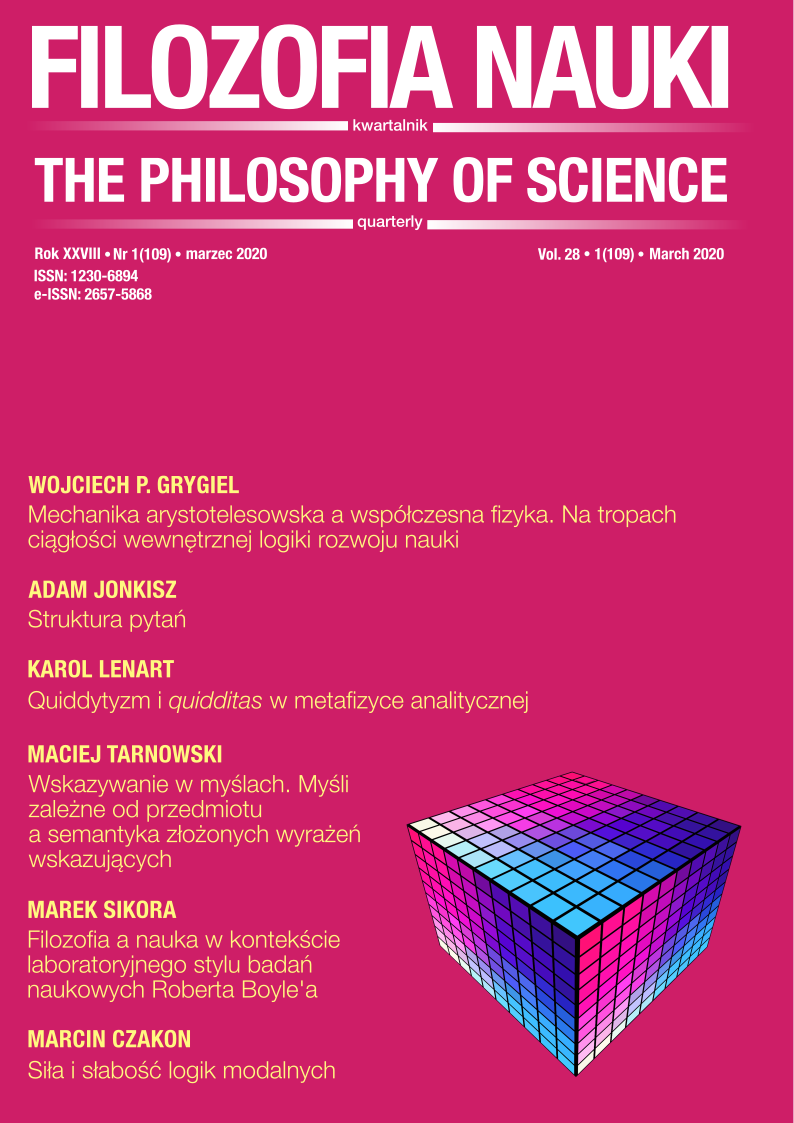Quidditism and Quiddity in Analytic Metaphysics
DOI:
https://doi.org/10.14394/filnau.2020.0003Keywords:
quidditism, properties, structuralism, causal powers, individuation, possible worlds, skepticismAbstract
The paper is a survey of contemporary quidditism, understood as two interrelated metaphysical positions — recombinatorial quidditism, which is an account of the nature of possibilities, and individuation quidditism, which is concerned with the problem of how to individuate properties. I have three aims: to examine the commitments and consequences of both views, to investigate the relationships between them, and to sketch the logic of the dispute between structuralism and
quidditism. I explain how these views relate to Ramseyan humility, according to which we cannot know the fundamental structure of the world.
References
Armstrong D. M. (1989), A Combinatorial Theory of Possibility, Cambridge: Cambridge University Press. https://doi.org/10.1017/CBO9781139172226
Barker S. (2009), Dispositional Monism, Relational Constitution, and Quiddities, „Analysis” 69(2), 242-250. https://doi.org/10.1093/analys/anp009
Bird A. (2007), Nature’s Metaphysics, Oxford: Oxford University Press.
Black R. (2000), Against Quidditism, „Australasian Journal of Philosophy” 78(1), 87-104. https://doi.org/10.1080/00048400012349371
Campbell K. (1990), Abstract Particulars, Oxford: Blackwell. https://doi.org/10.2307/2219793
Curtis B. L. (2016), Lewisian Quidditism, Humility, and Diffidence, „Philosophical Studies” 173(11), 3081-3099. https://doi.org/10.1007/s11098-016-0651-1
Divers J., Melia J. (2002), The Analytic Limit of Genuine Modal Realism, „Mind” 111(441), 15-36. https://doi.org/10.1093/mind/111.441.15
Efird D., Stoneham T. (2008), What is the Principle of Recombination?, „Dialectica” 62, 483-494. https://doi.org/10.1111/j.1746-8361.2008.01159.x
Ellis B., Lierse C. (1994), Dispositional Essentialism, „Australasian Journal of Philosophy” 72(1), 27-45. https://doi.org/10.1080/00048409412345861
Field H. (1988), Realism, Mathematics, and Modality, Oxford: Blackwell. https://doi.org/10.5840/philtopics19881613
Fine K. (1995), Senses of Essence [w:] Modality, Morality, and Belief, W. Sinnott-Armstrong (ed.), Cambridge: Cambridge University Press, 53-73.
Hawthorne J., Cover J. A. (1996), Haecceitism and Anti-haecceitism in Leibniz’s Philosophy, „Noûs” 30(1), 1-30. https://doi.org/10.2307/2216301
Hawthorne J. (2001), Causal Structuralism, „Philosophical Perspectives” 15, 361-378. https://doi.org/10.1111/0029-4624.35.s15.16
Heil J. (2003), From an Ontological Point of View, Oxford: Oxford University Press. https://doi.org/10.1093/0199259747.001.0001
Hildebrand T. (2016), Two Types of Quidditism, „Australasian Journal of Philosophy” 94(3), 516-532. https://doi.org/10.1080/00048402.2015.1112418
Ingarden R. (1961), Spór o istnienie świata, Warszawa: Państwowe Wydawnictwo Naukowe.
Kaplan D. (1975), How to Russell a Frege-Church, „The Journal of Philosophy” 72(19), 716-729. https://doi.org/10.2307/2024635
Kripke S. (2001), Nazywanie i konieczność, tłum. B. Chwedeńczuk, Warszawa: Aletheia.
Lenart K. (2018), Esencjalizm, antyhaecceityzm i haecceityzm, „Internetowy Magazyn Filozoficzny HYBRIS” 44, 131-151.
Leuenberger S. (2010), Humility and Constraints on O-language, „Philosophical Studies” 149(3), 327-354. https://doi.org/10.1007/s11098-009-9352-3
Lewis D. (1986), On the Plurality of Worlds, Oxford: Blackwell.
Lewis D. (2009), Ramseyan Humility [w:] Conceptual Analysis and Philosophical Naturalism, D. Braddon-Mitchell, R. Nola (eds.), Cambridge, MA: MIT Press, 203-222. https://doi.org/10.7551/mitpress/9780262012560.003.0009
Locke D. (2012), Quidditism without Quiddities, „Philosophical Studies” 160(3), 345-363. https://doi.org/10.1007/s11098-011-9722-5
Maurin A. S. (2011), An Argument for the Existence of Tropes, „Erkenntnis” 74(1), 69-79. https://doi.org/10.1007/s10670-010-9252-0
Moreland P. J. (1998), Theories of Individuation: A Reconsideration of Bare Particulars, „Pacific Philosophical Quarterly” 79(3), 251-263. https://doi.org/10.1111/1468-0114.00061
Parsons T. (1980), Nonexistent Objects, New Haven: Yale University Press. https://doi.org/10.2307/2185016
Park W. (1990), Haecceitas and Bare Particular, „Review of Metaphysics” 44(2), 375-397.
Plantinga A. (1976), Actualism and Possible Worlds, „Theoria” 42(1-3), 139-160. https://doi.org/10.1111/j.1755-2567.1976.tb00681.x
Plantinga A. (1979), De essentia, „Grazer Philosophische Studien” 7, 101-121. https://doi.org/10.5840/gps19797/819
Platon (2012), Sofista [w:] Uczta. Polityk. Sofista. Eutyfron, tłum. W. Witwicki, Warszawa: Wydawnictwo Naukowe PWN, 221-313.
Ramsey F. P. (1990), Theories [w:] F. P. Ramsey: Philosophical Papers, D. H. Mellor (ed.), Cambridge: Cambridge University Press, 112-136.
Roca-Royes S. (2011), Essential Properties and Individual Essences, „Philosophy Compass” 6(1), 65-77. https://doi.org/10.1111/j.1747-9991.2010.00364.x
Rosenkrantz G. S. (1993), Haecceity: An Ontological Essay, Dordrecht: Kluwer Academic Publishers. https://doi.org/10.1007/978-94-015-8175-2
Salmon N. (1996), Trans-world Identification and Stipulation, „Philosophical Studies” 84(2/3), 203-223. https://doi.org/10.1007/BF00354487
Schaffer J. (2005), Quiddistic Knowledge, „Philosophical Studies” 123(1-2), 1-32. https://doi.org/10.1007/s11098-004-5221-2
Shoemaker S. (1980). Causality and Properties [w:] Time and Cause, P. van Inwagen (ed.), Dordrecht: Springer, 109-135. https://doi.org/10.1007/978-94-017-3528-5_7
Sider T. (2006), Bare Particulars, „Philosophical Perspectives” 20, 387-397. https://doi.org/10.1111/j.1520-8583.2006.00112.x
Smith D. C. (2016), Quid quidditism est?, „Erkenntnis” 81(2), 237-257. https://doi.org/10.1007/s10670-015-9737-y
Wang J. (2016), The Nature of Properties: Causal Essentialism and Quidditism, „Philosophy Compass” 11(3), 168-176. https://doi.org/10.1111/phc3.12307
Williams D. C. (1953), On the Elements of Being: II, „Review of Metaphysics” 7(2), 171-192.
Wilson J. (2015), Hume’s Dictum and Metaphysical Modality [w:] The Blackwell Companion to David Lewis, B. Loewer, J. Schaffer (eds.), Oxford: Wiley Blackwell, 138-158. https://doi.org/10.1002/9781118398593.ch10
Whittle A. (2006), On an Argument for Humility, „Philosophical Studies” 130, 461-497. https://doi.org/10.1007/s11098-004-5751-7



















 Filozofia Nauki/The Philosophy of Science | ISSN 1230-6894 | e-ISSN 2657-5868
Filozofia Nauki/The Philosophy of Science | ISSN 1230-6894 | e-ISSN 2657-5868